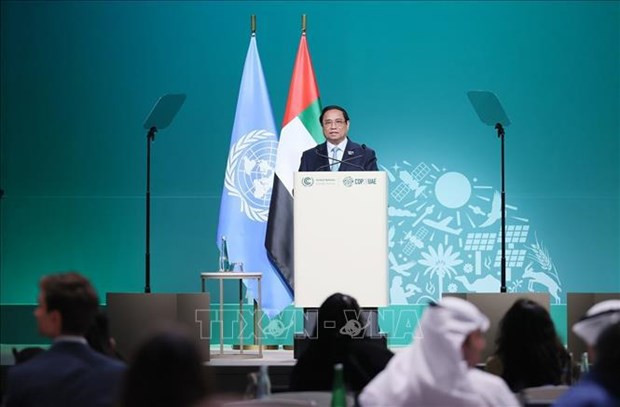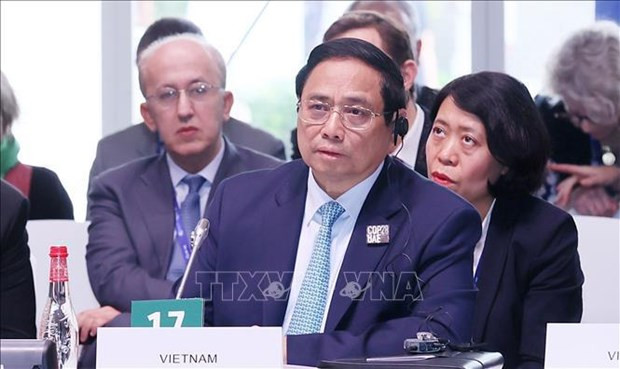
Prime Minister Pham Minh Chinh speaks at the World Climate Action Summit. (Photo: VNA)
Prime Minister Pham Minh Chinh called on the international community to strengthen solidarity, take drastic and effective actions, and make greater efforts for the prosperous development of humankind while addressing the World Climate Action Summit within the 28th UN Climate Change Conference (COP28) in Dubai, the UAE, on December 2.
The Vietnamese leader expressed his concern over the increasingly serious impacts of climate change amid the big gap between climate commitments and actions, and dispersed resources for climate change response due to competition, separation, war and conflict.
The Vietnamese leader expressed his concern over the increasingly serious impacts of climate change amid the big gap between climate commitments and actions, and dispersed resources for climate change response due to competition, separation, war and conflict.
He, therefore, emphasised that the motto of "putting words into action, delivering on commitments" is the key to consolidating trust between countries and breaking deadlocks in climate negotiations.
Climate change is a global issue, an issue of all people, he said, stressing that to effectively respond to the problem, a new, proactive, practical and more effective mindset and approach are needed along with concerted, global actions.
Each country should maximise its intrinsic strengths and stay united and cooperate with the international community in the combat, PM Chinh said, emphasising the importance of multilateralism, putting people and global interests at the centre, and not leaving any nation and citizen behind.
He pointed to the need to diversify the mobilisation of resources in response to climate change, combine public and private sectors, internal and external and bilateral and multilateral resources as well as other legal resources, especially private resources.
The Vietnamese PM called on developed countries to increase support for developing and underdeveloped nations, particularly in capital, technology, governance, and institutions. Meanwhile, he said, developing and underdeveloped countries must make greater efforts in the spirit that no one can do better for them than themselves.
He highlighted fairness and justice in climate action, and the need to ensure self-reliance, national energy security and access to clean energy for all businesses and people.
According to the leader, since COP26 which took place in the UK in 2021, Vietnam has simultaneously rolled out three groups of solutions. First of all, the country has built and implemented plans such as the climate change response strategy, the green growth strategy, the National Power Development Plan VIII, developing the renewable energy industry, and building a renewable energy ecosystem.
Second, the country has implemented the Nationally Determined Contributions (NDC), established a secretariat and announced the implementation plan and the Resource Mobilisation Plan for the Just Energy Transition Partnership (JETP), and launched a plan to develop one million hectares of high-quality, low-emission rice-growing areas.
The third group of solutions focus on institutional building, for example the Law on Oil and Gas, the Land Law, the Electricity Law.
The speech of PM Chinh was applauded by high-ranking leaders of many countries and international organisations who affirmed their readiness to cooperate, support and accompany Vietnam to achieve its climate and socio-economic goals.
The same day, the Vietnamese Government leader attended at a forum on acceleration of coal power transition chaired by French President Emmanuel Macron in the framework of COP 28. Addressing the forum, PM Chinh highlighted that it is time to shift to a cleaner energy even though Vietnam and many other developing countries could not deny the role of coal-fired electricity.
Climate change is a global issue, an issue of all people, he said, stressing that to effectively respond to the problem, a new, proactive, practical and more effective mindset and approach are needed along with concerted, global actions.
Each country should maximise its intrinsic strengths and stay united and cooperate with the international community in the combat, PM Chinh said, emphasising the importance of multilateralism, putting people and global interests at the centre, and not leaving any nation and citizen behind.
He pointed to the need to diversify the mobilisation of resources in response to climate change, combine public and private sectors, internal and external and bilateral and multilateral resources as well as other legal resources, especially private resources.
The Vietnamese PM called on developed countries to increase support for developing and underdeveloped nations, particularly in capital, technology, governance, and institutions. Meanwhile, he said, developing and underdeveloped countries must make greater efforts in the spirit that no one can do better for them than themselves.
He highlighted fairness and justice in climate action, and the need to ensure self-reliance, national energy security and access to clean energy for all businesses and people.
According to the leader, since COP26 which took place in the UK in 2021, Vietnam has simultaneously rolled out three groups of solutions. First of all, the country has built and implemented plans such as the climate change response strategy, the green growth strategy, the National Power Development Plan VIII, developing the renewable energy industry, and building a renewable energy ecosystem.
Second, the country has implemented the Nationally Determined Contributions (NDC), established a secretariat and announced the implementation plan and the Resource Mobilisation Plan for the Just Energy Transition Partnership (JETP), and launched a plan to develop one million hectares of high-quality, low-emission rice-growing areas.
The third group of solutions focus on institutional building, for example the Law on Oil and Gas, the Land Law, the Electricity Law.
The speech of PM Chinh was applauded by high-ranking leaders of many countries and international organisations who affirmed their readiness to cooperate, support and accompany Vietnam to achieve its climate and socio-economic goals.
The same day, the Vietnamese Government leader attended at a forum on acceleration of coal power transition chaired by French President Emmanuel Macron in the framework of COP 28. Addressing the forum, PM Chinh highlighted that it is time to shift to a cleaner energy even though Vietnam and many other developing countries could not deny the role of coal-fired electricity.

Prime Minister Pham Minh Chinh speaks at the forum on acceleration of coal power transition. (Photo: VNA)
Energy transition is an objective requirement of strategic benefits and a top priority of all countries, he said, stressing that however, the process should ensure the targets of economic development, national energy security, and job generation and it should not create any shocks for workers.
Vietnam will work to complete institutions, legal frameworks and policies to shift to renewable energy with a roadmap and steps suitable with the country's situation, along with evaluating and handling impacts of energy transition, mobilising finance and bolstering public-private and international cooperation to accelerate the process, he stressed.
PM Chinh took the occasion to thank G7 countries, including France, and other international partners for supporting Vietnam during the energy transition process, especially through the implementation of the Just Energy Transition Partnership (JETP), making contributions to the global green transition efforts.
He also asked international partners to enhance assistance for Vietnam in terms of preferential financing, advanced technologies, high-quality human resources training, and building of smart management systems.
Leaders of France, the European Commission, the US and international organisations welcomed Vietnam’s commitment and efforts, and affirmed they will accompany the Southeast Asian country in the energy transition process in the interests of the country and the world as a whole.
They laid stress on the necessity to reduce dependence on coal for electricity generation, push forward energy transition and develop renewable energy, while noting that developing countries should not be required to choose between energy transition and economic development.
They affirmed that they will build effective tools to support and accelerate the process./.VNA
Vietnam will work to complete institutions, legal frameworks and policies to shift to renewable energy with a roadmap and steps suitable with the country's situation, along with evaluating and handling impacts of energy transition, mobilising finance and bolstering public-private and international cooperation to accelerate the process, he stressed.
PM Chinh took the occasion to thank G7 countries, including France, and other international partners for supporting Vietnam during the energy transition process, especially through the implementation of the Just Energy Transition Partnership (JETP), making contributions to the global green transition efforts.
He also asked international partners to enhance assistance for Vietnam in terms of preferential financing, advanced technologies, high-quality human resources training, and building of smart management systems.
Leaders of France, the European Commission, the US and international organisations welcomed Vietnam’s commitment and efforts, and affirmed they will accompany the Southeast Asian country in the energy transition process in the interests of the country and the world as a whole.
They laid stress on the necessity to reduce dependence on coal for electricity generation, push forward energy transition and develop renewable energy, while noting that developing countries should not be required to choose between energy transition and economic development.
They affirmed that they will build effective tools to support and accelerate the process./.VNA